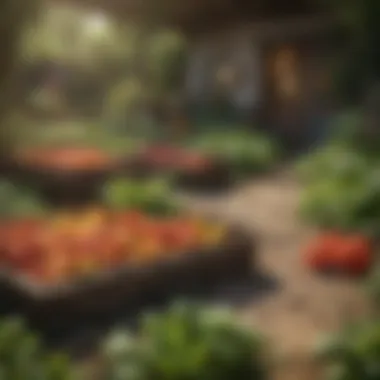Explore Mobile Simulation Games Like Gourmet Ranch


Intro
Mobile simulation games have gained substantial popularity in recent years, offering players a unique blend of creativity, strategy, and engagement. Among these, Gourmet Ranch stands out for its inviting gameplay where players manage a farm, grow crops, and cook dishes. This article will explore games that share similar gameplay elements and thematic features with Gourmet Ranch. By doing so, we aim to provide an in-depth understanding of this gaming niche and how various titles compare to one another.
As we delve deeper, we will analyze essential gameplay mechanics, graphics, narratives, and customization options that enrich the player experience in these simulation games. Furthermore, this article will reflect on community engagement and the aspects that make these games appealing. The subsequent sections will guide you through key points to enhance your gaming choices and expectations.
Preamble to Simulation Games
The realm of simulation games has grown in importance within the mobile gaming landscape. These games allow players to experience a variety of activities that simulate real-life situations. The growing popularity of simulation games, like Gourmet Ranch, highlights the desire of players to engage with virtual environments that resemble their own lives.
The significance of this article lies in its effort to explore the nuances of simulation mechanics, specifically those found in mobile games. These mechanics are not merely facets of gameplay but are crucial in defining how players interact with their gaming experience.
Defining Simulation Games
Simulation games are a diverse genre designed to closely mimic real-world activities. These can range from farm management to intricate life simulations. What binds these games together is their core premise: to provide a realistic and immersive experience. Often, these games encapsulate tasks such as resource management, creativity, and decision-making.
In this context, Gourmet Ranch serves as an excellent example. Players can cultivate crops, manage resources, and engage in activities that require strategic thinking. This well-designed structure encourages a deep connection with gameplay, making it relevant for those looking to understand the genre.
The Allure of Simulation Mechanics
The appeal of simulation mechanics is multifaceted. Players are drawn to the immersion these games provide. Unlike traditional gaming formats that may focus on quick reactions or combat scenarios, simulation games engage players on a cognitive level. Gamers get to build, manage, and create at their own pace, fostering a sense of accomplishment.
The mechanics often incorporate real-life principles. For instance, time management becomes critical when running a virtual farm or restaurant. This mirrors real-world scenarios and enhances the player's experience. Together, these elements create a robust gameplay loop that keeps players returning for more.
"Simulation games stimulate the mind while providing an entertaining escape into virtual worlds."
The commitment to authenticity is not just a design choice but a vital aspect of user experience in simulation games. Understanding these mechanics equips players with the context they need to navigate similar titles and appreciate the complexity behind their design.
Gourmet Ranch Overview
The significance of the Gourmet Ranch overview in this article lies in understanding its fundamental elements. It helps to establish a baseline for comparison with other games in the simulation genre. As players navigate through various titles, knowing what distinguishes Gourmet Ranch will enhance their gaming experience. This section will focus on key features, visual styles, and the community engagement aspect, highlighting the various benefits and considerations surrounding this game.
Core Gameplay Features
Gourmet Ranch combines various gameplay mechanics to create a unique simulation experience. Players take on the role of managing a farm where they grow ingredients and prepare gourmet dishes. This core loop centers around resource management, time optimization, and strategizing workflows. Players must decide which crops to plant based on market demand and seasonality, adding depth to the gameplay. Additionally, the cooking aspect introduces another layer of complexity. Players experiment with recipes to find the best combinations, leading to potential rewards such as increased reputation and customer satisfaction. The dual focus on farming and cooking keeps the gameplay dynamic and engaging.
Visual and Artistic Direction
The visual and artistic direction of Gourmet Ranch is another compelling aspect. The graphics feature vibrant colors and charming animations, which draw players into its whimsical world. The art style strikes a balance between realism and cartoonish flair, making it accessible for a broad audience. This aesthetic appeal is important as it creates an inviting atmosphere that encourages prolonged engagement. Players appreciate a pleasant visual experience, which can often influence their overall enjoyment of the game. The attention to detail in character designs and environmental elements adds richness to the gaming landscape.
Player Community and Engagement
Community engagement plays a crucial role in the success of Gourmet Ranch. Active player feedback shapes game updates and new features, reinforcing the connection between developers and users. Players often share strategies, tips, and personal experiences on platforms like Reddit and Facebook. This shared knowledge fosters a sense of belonging among players, making the gaming environment more enjoyable. The vibrant community around Gourmet Ranch provides players with a wealth of resources to enhance their gameplay. Furthermore, participating in community events and contests can lead to exclusive in-game rewards, increasing player motivation.
"The strength of a game often lies not just in its mechanics but in the community it nurtures."
In summary, the overview of Gourmet Ranch reveals its various components and why they matter in the broader context of simulation games. Each feature contributes to an overall immersive experience that resonates with players. Understanding these facets prepares players to explore other titles with similar characteristics.
Games with Similar Mechanics


The exploration of games that exhibit similar mechanics to Gourmet Ranch is essential for understanding the landscape of mobile simulation games. These titles often feature core gameplay elements that resonate with players, offering benefits such as engaging gameplay loops, community involvement, and diverse strategies. By analyzing these mechanics, players can identify what aspects they value most, whether it is resource management, cooking dynamics, or ecological sustainability. This section dives into specific genres aligned with Gourmet Ranch, shedding light on their unique contributions and player appeal.
Farming and Resource Management Games
Harvest Moon: Mobile Edition
Harvest Moon: Mobile Edition represents a hallmark of farming simulations. One specific aspect is its immersive farming experience, allowing players to cultivate crops and manage livestock. This title draws players who appreciate a gentle pace and the joys of rural life. A key characteristic of this game is its visual style, which evokes a nostalgic feeling while delivering a modern user experience.
The unique feature of Harvest Moon: Mobile Edition is the depth of relationships that players can foster within the game. Engaging with various characters adds layers of storytelling and personal connections. However, the game can feel limited in its overall scope and competitive elements compared to other titles.
FarmVille
Transitioning to FarmVille 3, this game expands the genre with a richer interaction model. One specific aspect is the vibrant social system that allows players to visit friends' farms and participate in cooperative missions. Its key characteristic is the emphasis on community and connection, enhancing the experience of farm management. Players appreciate the blend of farming and social gaming that FarmVille 3 offers.
The unique feature involves the introduction of varied animal breeds that players can collect and raise. This aspect adds a layer of strategy, as players must balance their resources to care for these animals effectively. Nevertheless, a disadvantage is the game's reliance on monetization strategies which can affect gameplay enjoyment for some users.
Cooking and Restaurant Management
Restaurant Dash
Restaurant Dash brings a speed-driven approach to cooking and management games. A significant aspect is its fast-paced gameplay that challenges players to create dishes under pressure. The key characteristic lies in its time management mechanics, which require thoughtful decision-making and quick reactions. This game is beneficial for those who enjoy multitasking and competition in culinary settings.
The unique feature of Restaurant Dash is the diverse menu options players can create, unlocking new recipes as they progress. This promotes a sense of accomplishment. However, the game can sometimes feel repetitive, as the mechanics may not evolve significantly past certain levels.
Cooking Fever
On the other hand, Cooking Fever emphasizes a rich variety of cuisines and restaurant setups. Specific to this game, players can travel to different locations, offering a geographical breadth that enhances the culinary journey. A distinctive aspect that stands out is the extensive customization options available for both dishes and restaurant interiors. This allows players to express creativity and individuality.
While Cooking Fever is well-regarded for its engaging gameplay, one disadvantage can be its aggressive monetization cash-seeking features, which may detract from the immersive experience.
Eco-Friendly Farming Simulations
Stardew Valley
When discussing eco-friendly farming simulations, Stardew Valley is often highlighted for its engaging narrative and farming mechanics. One critical aspect is the portrayal of sustainable farming practices, urging players to interact positively with nature. The key characteristic of Stardew Valley is its combination of farming, mining, and relationship-building. This depth serves as a comprehensive role-playing experience.
A unique feature is the ability to marry and start a family within the game. This relationship dynamic adds emotional weight to the farming experience. Conversely, some players might find the initial learning curve steep given the vast amount of gameplay options available.
My Time at Portia
Finally, My Time at Portia stands out with its blend of farming and crafting mechanics intertwined with an expansive world to explore. A specific aspect is its vibrant environment that encourages players to gather resources. The key characteristic here is the emphasis on customization and personal development. Players can build relationships within the town, enriching their game experience.
The unique feature of My Time at Portia lies in its crafting system, allowing players to create tools and machines, broadening the horizons of what farming can entail. One disadvantage could be the resource management, which can feel overwhelming to some players without experience in such mechanics.
Thematic Resonance Across Games
The thematic resonance in simulation games plays a crucial role in shaping player experiences and preferences. Games such as Gourmet Ranch encapsulate certain themes that resonate deeply with players, which can make them appealing and immersive. It is essential to explore these themes, as they create the foundations that connect various games within the genre. By understanding thematic resonance, players can appreciate not only what draws them to a game but also how these elements foster community and engagement.
Nature and Environment Themes


Nature and environment themes in simulation games are significant for several reasons. They create a sense of escapism and allow players to explore virtual versions of the earth's outdoors without leaving their homes. Gourmet Ranch effectively utilizes these themes by incorporating natural landscapes, gardens, and sustainable farming practices. This encourages players to develop a connection with the environment, raising awareness about nature and its importance.
Additionally, integrating nature into gameplay can serve educational purposes, highlighting ecological issues or sustainable practices. Titles like Stardew Valley delve into such matters by allowing players to cultivate their farms while promoting biodiversity. Players might find joy in planting real-life crops or harvesting resources from their virtual worlds, further enhancing their experience.
Incorporating nature's beauty into game design is also integral for sure engagement. It provides players with a visually appealing environment that enhances their overall exploration experience. Vibrant landscapes and dynamic weather patterns can keep players engrossed for longer periods, motivating them to return for new interactions. Environments can also change according to the in-game seasons, avoiding monotony and adding layers to gameplay, ultimately enriching thematic resonance.
Community Interaction and Cooperative Play
Community interaction and cooperative play have become significant components in simulation games. This aspect fosters social relationships among players, which can enhance engagement and enjoyment. In Gourmet Ranch, players may find opportunities to interact with other players, share experiences, and even engage in cooperative tasks. Such interactions contribute to building a sense of community, vital for creating a thriving gaming environment.
Many simulation games now integrate systems wherein players can collaborate on various tasks. For example, in FarmVille 3, players might work together to achieve collective goals or complete community challenges. This collaborative element not only strengthens bonds among players but also instills a sense of accomplishment when goals are reached together.
Cooperative play also has the potential to facilitate learning and skill-sharing. Players can exchange tips and strategies, leading to improved gameplay. Whether through social media channels, forums like Reddit, or in-game chats, players can form robust communities centered around mutual interests in simulation gaming. This dynamic can significantly enhance user experience, making it more rewarding and enriching.
"The defining characteristic of simulation games is how they weave personal stories through shared experiences, connecting players in meaningful ways."
Overall, thematic resonance across games enriches player experiences, drawing them into the worlds crafted by developers. By focusing on nature, community interaction, and cooperative play, developers are able to create engaging environments tailored for diverse audiences.
User Experience and Engagement Dynamics
In the realm of mobile games, user experience and engagement dynamics play a pivotal role. Such aspects determine not only how players interact with the game but also the longevity and success of the title. For games like Gourmet Ranch, understanding these components is essential for both developers and players alike. The right balance between gameplay mechanics, visual appeal, and player feedback can significantly enhance enjoyment and satisfaction.
Monetization Strategies
Monetization is a crucial aspect of mobile games. Various strategies are employed to generate revenue while maintaining player satisfaction. Some typical approaches include in-app purchases, advertisements, and premium game versions.
In Gourmet Ranch, players may encounter optional purchases that enhance gameplay without obstructing it. This fair approach fosters goodwill among users and encourages continued engagement. Here are some strategies:
- In-App Purchases: Players can buy virtual goods to improve their gaming experience. This allows customization and faster progress.
- Ads with Reward: Players watch short ads in exchange for in-game rewards. This method is popular for keeping the gameplay free.
- Subscription Models: Offering exclusive content and benefits for a monthly fee. Regular players might find value in such a model.
These strategies, when applied wisely, can encourage deeper engagement without alienating the player base.
Game Updates and Community Feedback
Sustaining player interest often hinges on frequent updates and the integration of community feedback. The gaming community thrives on interaction and input. Developers should actively listen to suggestions and concerns raised by players.
Regular updates introduce new content, enhance existing features, and fix bugs. This practice shows that developers value their players' input. For instance, introducing new recipes or events in Gourmet Ranch can renew interest and excite the community.
Additionally, developers can utilize platforms like Reddit and Facebook to engage with players. These interactions can lead to:
- Stronger Player Relationships: Engaging with the community fosters loyalty.
- Enhanced Game Quality: Feedback allows developers to address shortcomings swiftly.
- User-Driven Content: Incorporating player suggestions can lead to creative game expansions.
"Listening to the community can transform a good game into a great one."
Assessing Popular Alternatives
Assessing popular alternatives is crucial in understanding the gaming ecosystem, particularly for mobile simulation games like Gourmet Ranch. Exploration of similar games enriches the player's experience and informs their preferences. Knowing what options are available helps players make informed decisions regarding gameplay, mechanics, and themes that best suit their interests.
When players compare alternatives, they gain insights into what features enhance a game's appeal. Alternatively, they discover mechanics that may not be engaging or beneficial. Recognizing these elements not only provides clarity on what makes a game enjoyable but also emphasizes variety within the genre.


Comparative Analysis of Features
In analyzing games similar to Gourmet Ranch, a comparative analysis of features reveals critical similarities and divergences in gameplay mechanics, graphical presentation, and user interaction. For instance, let's examine Harvest Moon: Mobile Edition and FarmVille 3.
- Gameplay Mechanics: Both games focus on farming but differ in complexity. Harvest Moon offers a more narrative-driven experience with an emphasis on relationship-building, while FarmVille 3 leans towards fast-paced farming with quick rewards.
- Resource Management: Managing resources varies significantly. In Cooking Fever, resource management intertwines with cooking mechanics, necessitating strategic planning for efficient kitchen operations.
- Visual Direction: The artistic style influences player engagement. Stardew Valley employs pixel-art graphics appealing to nostalgia, while My Time at Portia presents 3D graphics, adding depth to the immersive experience.
Understanding these differences aids players in selecting games that match their desired experience. Such analysis also highlights innovative design trends worth noting.
User Ratings and Reviews
User ratings and reviews play an essential role in assessing popular alternatives in simulation games. They provide first-hand accounts from players, offering practical insights into the gameplay experience. A game might have vast marketing but only survive through genuine user satisfaction.
- Importance of Ratings: Ratings can signal a game's strengths and weaknesses. High ratings often correlate with enjoyable gameplay and solid mechanics. Conversely, low ratings might suggest repetitive gameplay or lack of user engagement.
- Review Analysis: Reading through user reviews offers a glimpse into what to expect. Players frequently mention aspects like story depth, graphics quality, and customer support.
"User experiences shape the game's reputation. A highly-rated game may still fall short of expectations if reviews discuss significant flaws."
By delving into the nuances of popular alternatives, one equips oneself with valuable knowledge—ensuring a more fulfilling gaming experience.
Future Trends in Simulation Games
The landscape of simulation games is evolving rapidly, with trends that reflect changes in technology, player expectations, and the gaming culture at large. Understanding these future trends is crucial for enthusiasts and developers alike. As the gaming industry continues to push the boundaries of what's possible, staying informed about emerging technologies and practices will equip players to appreciate and engage with new titles more effectively. Moreover, developers can align their products with these trends, enhancing player satisfaction and ensuring long-term engagement.
Emerging Technologies in Gaming
The advancements in technology have a significant impact on simulation games. With the rise of augmented reality (AR) and virtual reality (VR), games can offer immersive experiences like never before. Players now expect realistic interactions that mirror real-world actions. For instance, mobile simulation titles like Gourmet Ranch could integrate AR features to create a more interactive gameplay experience. This allows players to visually see the results of their decisions in a 3D space, enhancing the game immersion.
Furthermore, artificial intelligence (AI) plays a pivotal role. The use of AI can personalize gameplay, adapting to individual player styles and preferences. Games can analyze player behavior and provide tailored recommendations or challenges, which keeps the experience fresh and engaging. This evolving nature of AI should not be overlooked, as it might become a standard aspect of simulation games, making them more compelling.
Like any technological evolution, there are challenges to consider. The incorporation of high-end graphics and advanced AI can lead to increased development costs and may require more robust devices. However, the benefits often outweigh these complications, with players willing to invest in better hardware for enhanced experiences.
Shift Towards Sustainable Practices
There is also a noticeable shift towards sustainability within the gaming community. This trend acknowledges the growing awareness of environmental issues among players. Simulation games can serve as platforms for educating audiences about sustainable practices and eco-friendly living. Games like Stardew Valley explore themes of farming and ecological balance, engaging players in discussions on real-world applications of sustainability.
Developers are increasingly tasked with addressing ecological concerns within their game mechanics. This may involve designing games that encourage players to manage resources wisely or create virtual environments that promote biodiversity. An example is the method of resource regeneration that mirrors real-life ecosystems, fostering a sense of responsibility among players.
Additionally, creating games that highlight the importance of community support and ecological stewardship can strengthen player engagement. Players are looking to connect with titles that align with their values, particularly regarding environmental concerns. Such games not only entertain but also offer a perspective on living responsibly on our planet.
"The future of simulation games is about creating meaningful interactions that go beyond entertainment. It’s about building awareness and promoting sustainable practices among players."
As these trends develop, simulation games are set to become more than just sources of entertainment. They aim to reflect societal values and technological progress, preparing players for the challenges and opportunities that lie ahead. Understanding these dynamics will help players and developers to navigate the future of simulation gaming.
Ending
In the realm of mobile simulation games, the conclusion serves as a vital reflection on the enduring appeal and multifaceted nature of these games. The analysis encapsulated within this article provides an exhaustive overview of games that resonate with the essence of Gourmet Ranch. As highlighted throughout, simulation games draw players in with a unique blend of creativity, strategy, and a sense of accomplishment.
The Lasting Appeal of Simulation Games
The lasting appeal of simulation games can be attributed to several key factors:
- Engaging Gameplay Mechanics: Players enjoy the intricacies involved in managing resources and creating vibrant virtual worlds. This challenge fosters a sense of satisfaction.
- Cognitive Development: Simulation games often require planning and critical thinking, engaging the mind and enhancing skills in time management and problem-solving.
- Community Involvement: Many simulation titles promote player interaction through competitive and cooperative modes, allowing players to share experiences and strategies.
"The immersive nature of simulation games creates an environment for both relaxation and stimulation, which is appealing to various player demographics."
- Creative Expressions: These games encourage players to express their imagination. Whether it’s designing a dream farm in Stardew Valley or managing a bustling restaurant in Cooking Fever, players find joy in crafting their unique gameplay experiences.
- Accessibility: The mobile platform ensures that simulation games are accessible to a broad audience. Players can engage with their favorite titles anytime and anywhere, making the genre more appealing.
Through these points, it is clear why simulation games continue to thrive. They fulfill a variety of player needs—be it intellectual challenge, community engagement, or creative outlets. As we look to the future, understanding these elements will help enhance the gaming experiences similar to Gourmet Ranch and beyond.







